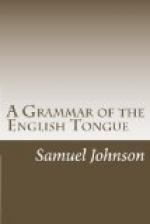Words derived from Latin written with de or dis retain the same signification; as distinguish, distinguo; detract, detraho; defame, defamo; detain, detineo.
The termination ly added to substantives, and sometimes to adjectives, forms adjectives that import some kind of similitude or agreement, being formed by contraction of lick or like. A giant, giantly, giantlike; earth, earthly; heaven, heavenly; world, worldly; God, godly; good, goodly.
The same termination ly, added to adjectives, forms adverbs of like signification; as, beautiful, beautifully; sweet, sweetly; that is, in a beautiful manner; with some degree of sweetness.
The termination ish added to adjectives, imports diminution; and added to substantives, imports similitude or tendency to a character; as green, greenish; white, whitish; soft, softish; a thief, thievish; a wolf, wolfish; a child, childish.
We have forms of diminutives in substantives, though not frequent; as a hill, a hillock; a cock, a cockrel; a pike, a pickrel; this is a French termination: a goose, a gosling; this is a German termination: a lamb, a lambkin; a chick, a chicken; a man, a manikin; a pipe, a pipkin; and thus Halkin, whence the patronymick, Hawkins; Wilkin, Thomkin, and others.
Yet still there is another form of diminution among the English, by lessening the sound itself, especially of vowels, as there is a form of augmenting them by enlarging or even lengthening it; and that sometimes not so much by change of the letters, as of their pronunciation; as, sup, sip, soop, sop, sippet, where, besides the extenuation of the vowel, there is added the French termination et; top, tip; spit, spout; babe, baby; booby, [Greek: Boupais]; great pronounced long, especially if with a stronger sound, grea-t; little, pronounced long lee-tle; ting, tang, tong, imports a succession of smaller and then greater sounds; and so in jingle, jangle, tingle, tangle, and many other made words.
Much however of this is arbitrary
and fanciful, depending wholly on
oral utterance, and therefore
scarcely worthy the notice of Wallis.
Of concrete adjectives are made abstract substantives, by adding the termination ness; and a few in hood or head, noting character or qualities: as white, whiteness; hard, hardness; great, greatness; skilful, skilfulness, unskilfulness; godhead, manhood, maidenhead, widowhood, knighthood, priesthood, likelihood, falsehood.
There are other abstracts, partly derived from adjectives, and partly from verbs, which are formed by the addition of the termination th, a small change being sometimes made; as long, length; strong, strength; broad, breadth; wide, width, deep, depth; true, truth; warm, warmth; dear, dearth; slow, slowth; merry, mirth; heal, health; well, weal, wealth; dry, drought; young, youth; and so moon, month.
Like these are some words derived from verbs; die, death; till, tilth; grow, growth; mow, later mowth, after mowth; commonly spoken and written later math, after math; steal, stealth; bear, birth, rue, ruth; and probably earth, from to ear or plow; fly, flight; weigh, weight; fray, fright; draw, draught.




